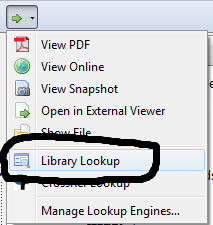 You've probably seen the "Find Full Text" button in some article databases that allows you to locate the full text of an article online. Zotero allows you to use the same feature.
You've probably seen the "Find Full Text" button in some article databases that allows you to locate the full text of an article online. Zotero allows you to use the same feature.
To enable Zotero to access the "Find Full Text" server, select the "edit" menu and choose Preferences. Select the Advanced tab. Near the bottom, find "OpenURL" box:

Select the "Custom" menu, filter to "North America," and select Hope College.
You can also add our OpenURL link manually:
https://col-hope.primo.exlibrisgroup.com/discovery/openurl?institution=01COL_HOPE&vid=01COL_HOPE:HOPE&
Then select OK to save your preferences. Once you've set this up, you can click the Library Lookup button on any citation you're viewing to search for the item online.

Mendeley Desktop/Mendeley Reference Manager supports importing your documents directly from Zotero.
To import your Mendeley library, follow these steps:
You'll be asked to log in to Mendeley to allow Zotero to perform the import. Your Mendeley password is never seen or stored.
More information and troubleshooting steps are available at: https://www.zotero.org/support/kb/mendeley_import
It's easy to add PDFs to your Zotero library and automatically import their citation info.
First, enable PDF indexing on the Search tab of Zotero's preferences. Zotero will download and install a small plugin.
Next, just drag your PDF files into the Zotero pane.
Right-click the PDFs and choose "Retrieve Metadata for PDFs." Zotero will retrieve their citation data from Google Scholar and turn them into citeable items with PDF attachments.
If Zotero can't find a match on Google Scholar, don't worry -- you can still save the citation from another catalog or article database, then drag the PDF onto the citation to make it an attachment.
 Have the book in front of you and want to add it to your Zotero library without having to search for a citation?
Have the book in front of you and want to add it to your Zotero library without having to search for a citation?
If you have a book's ISBN, an online article's DOI or PMID number, just click the magic wand button: "Add item by identifier." Type in the book or article's number, and Zotero will automatically download its information and save it to your library.
On a public computer? Don't have the time or bandwidth to install Zotero? No worries! Zotero offers a quick, web-based resources called Zotero Bib (https://zbib.org/) that enables you to paste in a resource URL, ISBN, DOI, PMID, arXiv ID, or title), select your resource, and choose your citation style. Once Zotero Bib has created the citation, you can copy it, download it:

Need a citation fast and you have your phone or tablet? Zotero has an official app for iOS as well as links to several apps for Android. Learn more at: https://www.zotero.org/support/mobile
If you're regularly using more than one computer in your research, Zotero's sync feature can keep your library up to date on all of them. Zotero can store a copy of your library on the Zotero.org server and check it for updates whenever you open your library on a different computer. All your computers must be running the same version of Zotero.
First, set up a (free, of course) Zotero.org user account. Then:
Repeat this configuration on each of your computers. Any updates you make on one of your computers will be reflected on the others. This even works to synchronize your library among Windows, Mac and Linux computers.
For more details and help troubleshooting sync problems, check the Zotero site.

Zotero can't automatically capture citation info from regular web pages, but you can still add them to your Zotero library.
By Default, Zotero will offer to save a snapshot of a given web page.

A snapshot is a copy of the page saved to your computer. It includes the page's text and images, so if the page is removed later, you will continue to have a visual representation of the page available for your use.
You can also save a snapshot via Zotero's "right-click" menu:
